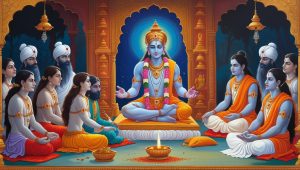
Festivals and Rituals Celebrating Ajitnath
Festivals dedicated to Ajitnath, the second Tirthankar, are filled with rituals, prayers, and acts of compassion, keeping his timeless teachings alive.

Festivals dedicated to Ajitnath, the second Tirthankar, are filled with rituals, prayers, and acts of compassion, keeping his timeless teachings alive.

From ancient hills to intricately carved temples, the historic sites linked to Tirthankar Ajitnath are timeless symbols of devotion, culture, and Jain heritage.

Tirthankar Ajitnath’s life and teachings deeply shaped Jain philosophy, reinforcing values of non-violence, truth, and spiritual discipline that guide followers even today.

The elephant emblem of Tirthankar Ajitnath is more than a religious symbol—it represents strength, patience, and the steady march toward spiritual liberation.

The life of Tirthankar Ajitnath is woven with inspiring stories that reveal his compassion, wisdom, and unwavering commitment to the path of liberation.

Tirthankar Ajitnath’s teachings form the bedrock of Jain ethics—guiding humanity toward non-violence, truth, and liberation through self-discipline.

Temples dedicated to Tirthankar Ajitnath are not just places of worship—they are timeless sanctuaries of peace, devotion, and spiritual heritage in Jainism.

Ajitnath, the second Tirthankar of Jainism, is a timeless source of wisdom whose teachings inspire seekers to rise above desires and live in harmony with all beings.

Tirthankar Ajitnath’s role in Jainism goes beyond history—he represents the victory of the soul over worldly attachments and the eternal journey toward liberation.

Tirthankar Ajitnath, the second Tirthankar of Jainism, is revered for his profound wisdom, deep compassion, and commitment to non-violence. His life story is a guiding light for those seeking inner peace and liberation.